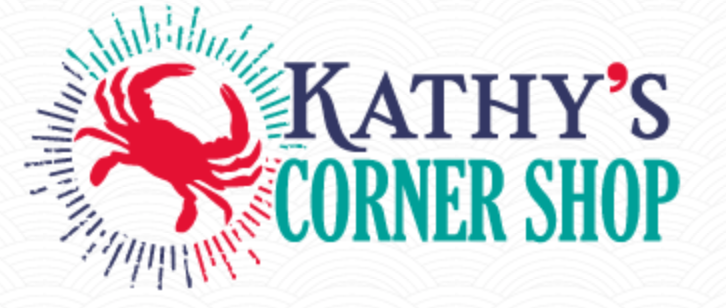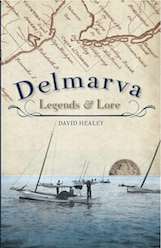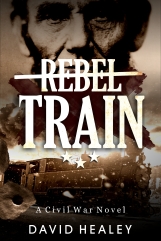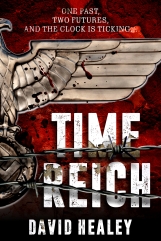
by David Healey
As if anyone needed further proof that Delmarva is a place unto itself, the people speak a different tongue. This language of the land between the bays is known as Delmarvese. You’ve heard it, even if you haven’t put a name to it. It’s that unique pronunciation that signals you’re from here and everybody else isn’t.
Caught me some feesh. Gaoin downy oh-shun. Eat some cray-abs.
Delmarva accents (Eastern Shore accents) have twangy vowels, punctuated by a long “0” sound. It’s an accent that’s distinctly Southern in its own way. My first real introduction to this matter of local pronunciation occurred when I moved to Cecil County. I pronounced it See-cil. But old-timers insist on Sissal or even Sessal — much as the first English settlers would have said it.
Linguists will tell you that Delmarva’s unique way of speaking goes beyond mere accent. Delmarvese is a recognized dialect — a unique pattern of speech — that has its roots in the Elizabethan adventurers who arrived in Shakespeare’s era.
One of the ways dialect survives is through isolation, which is why it lasted so long on Delmarva.
“That is one of the factors. But it’s not that people don’t have access to other dialects through television and other media,” explained Tonia Bleam, lecturer in the Department of Linguistics at the University of Maryland. “There’s also a sense of identity. Speaking in a dialect might not be that conscious of a thing. But if you start to talk differently, your friends might think you are putting on airs. You might have different ways of speaking in different situations, such as when dealing with outsiders.”
Isolation certainly plays a role in places such as Smith Island and Tangier Island. These remote islands in Chesapeake Bay are recognized as having some of the truest Elizabethan dialects. But what does that mean?
Experts say centuries ago, the English language reached a fork in the road. Modern British — the kind we hear on BBC shows today — stayed at home but followed a path of change and evolution. The English spoken by the Elizabethan explorers, soldiers and settlers who came to early America stayed right here and did not evolve as much.
Some linguists and Shakespearean scholars make a case that Elizabethan sounded a lot like a Scottish brogue. The verbal tics are easy to pick up on if you know what to listen for.
Vowels like “a” are short and drawn out a little (think haaave and haaat). The “u” comes out shortened and combined with an oo sound (bush becomes boosh, for example). The biggest difference can be heard in the dipthongs, or vowels placed side by side. Modern English blends the sounds together, but Elizabethans would have pronounced each vowel — why else would they be in the word, right? An Elizabethan would have pronounced house as huh-oose. If you listen closely, it all starts to sound rather Delmarvesque.
Beyond accent, sentence structure bears similarities to an older English. A New York Times writer described it this way: “Mainlanders say, logically enough, ‘Look how blue the sky is.’ Not the Shoreman. He says, ‘Look at the sky, how blue it is.’ ” Now that sounds like Shakespeare.
“When we talk about different dialects we are really looking at all levels of structure,” Bleam said. While the older forms of English (such as those heard on Delmarva) stay the same, “It’s often the standard English that’s quickly changing.”
You don’t have to visit the remote areas of Delmarva to hear this dialect. If you troll YouTube, you will come across videos of locals conversing in their very own lingo.
I experienced this very phenomenon myself back in the early 1990s, during a visit to the town of Church Creek in Dorchester County. Vast salt marshes surround the town and as you drive into Church Creek you’ll pass a huge sculpture of a mosquito, which says volumes about this community’s sense of humor.
I drove down to Church Creek with a friend who was originally from Harford County, but had taken up residence in a half-abandoned vacation home long enough to join the volunteer fire company and get to know some people in the community. He had since moved away, but took me along for a visit. We stopped by the firehouse and talked with a couple of guys he knew. Normal enough. Then a third guy stopped by, and the three of them seemed to forget we were there and started jabbering among themselves in a seemingly foreign dialect.
It was spooky, like getting caught up in a time warp. I’d heard about this legendary Elizabethan dialect, but I’d been skeptical. Now I was a believer.
Sadly, it’s likely that the unique Delmarva dialect is in danger of dying out. But for now, it always seems like there is still an old-timer somewhere who talks the talk. Last summer, we ran into one selling produce at a roadside stand: “You can go right home now and put that ear in’ the booling wooter!”
Taking the sack filled with ripe sweet corn, it became clear that some Delmarvese requires no translation.
This article originally appeared in the Delmarva Quarterly.




















Very enjoyable
Sent from my iPhone
>
Living on Chincoteague, is not unlike your visit to the firehouse. 2 old timers are understandable, but when there are 3 or more,they may as well be speaking Chinese! It really takes concentration to follow a conversation with a gaggle of old timers here 🙂 ,but I wouldn’t change it for the world.
Thanks for your research on this. Both sides of my family have been on The Peninsula for more than 3 centuries. My grandfather and many generations before him were from the area around Church Creek (We say “Church Crick”). I work in Dover where not very many people are of native Delmarvan families, and I often get teased about my “accent”. (I’m home; they are the “transplants”. So, they’re the ones that have the accent, not me.) Language has always interested me (even other languages and dialects), and I’m pretty good at figuring out where someone is from based on their speech. But I never realized how much of an influence Elizabethan English still has on the Delmarvan dialect until I read your article. Just like the men at the firehouse, many of us make a point to enunciate a little differently when speaking with non-natives. While at work I took a phone call from my brother and was later asked jokingly, “What language were you speaking?!” I’ve heard the same after speaking with another co-worker that is from a family with at least 5 generations on Delmarva. It’s not just the speech. It’s like when I’m talking with others like me I tend to be more relaxed. Lengthy Delmarvan lineage seems to bind many of us natives together in that we have very similar values and enjoy the same types of recreation and social events. More and more people moving here from other areas. That, along with the introduction of voice recognition technology, definitely contributes to the dying out of the Delmarvan dialect.
I’ve now been away from home since 2004 after returning from the Marine Corps and I’ve come to miss the dialect. I find myself watching those YouTube videos mentioned in the article to feel a sense of home, now living in Atlanta.
Occasionally I’ll slip back into the dialect with certain words like “wooter” and “warsh” or friends will catch it when I say words with that long O like “phOne” or “hOme”.
I first realized that I had a unique accent only when a friend I was talking with while at LeJeune asked “Where are you from?”. When I said Maryland his first response was “People from Maryland really talk like that?”.
I was confused and dumbfounded. “Talk like what?” I asked. He simply said “Well, I can’t tell if it Southern, a little Northern, or a mix of both.” It was that moment I realized that I had the privilege of being from a unique and special place and I wish it would never change.
Thanks for sharing, Jason! We usually don’t notice our own accent until we spend some time elsewhere … then it’s nice to get back home to spend some time on the wooter and maybe eat some crayabs. My ears sing when I hear an old-timer talk like that.
Yes sir, that accent along with the smell of fresh saltwater brings me home every time. One of my favorite words I forgot to mention, that older folks used when I was a kid, was spigot. I grew up using the word, not knowing any better, and other kids looked at me like I was foreign. 😂
What else would we call that but a spigot! I love to hear these old words and phrases … long may they echo!
David: Would you consider coming to Easton, MD and giving a talk on the subject of Delmarva Accents and a taste of your own experiences? I see that you are a prolific writer and marvel at the number of books you have authored. I am on the Board of the Chesapeake Forum (ALL) and we offer a wide range of programs for our folks, many of whom have retired to the Eastern Shore and hold graduate degrees and who relish learning about the history of the area.
I think you would be a sell-out! Please consider this invitation and let me know if you have any interest in joining our fine “faculty” and community partners.
Regards,
Dodie Theune, PhD
chesapeakeforum.org
Thank you so much for your note and for thinking of me. However, I’m going to hold off for a bit because my teaching schedule is a lot right now. Hopefully, I can do something with your group down the road. Best, David